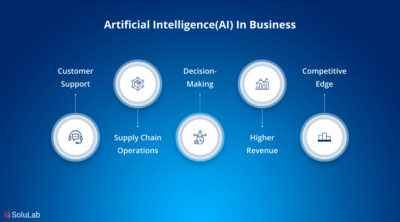Maximizing the use of Artificial Intelligence (AI) in business involves integrating AI across various operational and strategic areas to improve efficiency, decision-making, and customer experiences. Here are key strategies to help businesses leverage AI:
1. Automating Repetitive Tasks
AI can automate routine tasks, such as data entry, customer support (via chatbots), and even invoicing or payroll processing. This helps reduce operational costs and frees up employees to focus on more strategic activities.
Unlock Your Full Potential with Our 100-Hour Masterclass: The Ultimate Guide to Excel, Python, and AI
2. Enhancing Customer Service
AI-powered chatbots, virtual assistants, and automated response systems can provide 24/7 customer support, answer frequently asked questions, and help resolve issues faster. This improves customer satisfaction and reduces human resource costs.

3. Personalizing Marketing and Sales
AI can help businesses analyze customer data to create personalized marketing campaigns. By using machine learning algorithms, businesses can recommend products based on past behaviors, segment customers more accurately, and predict purchasing patterns.
Also read about How to protect your website against phishing
4. Improving Decision-Making with Predictive Analytics
AI can analyze vast amounts of historical data to make accurate predictions. Predictive analytics can guide decision-making in areas like inventory management, demand forecasting, pricing strategy, and even risk management.
5. Optimizing Supply Chain Management
AI can optimize supply chain operations by predicting demand, identifying the best suppliers, and optimizing routes for shipping. It can also assist in inventory management, reducing waste and ensuring better stock levels.
6. Enhancing Product Development
AI can accelerate product development by analyzing customer feedback, identifying trends, and helping create innovative solutions. It can also simulate and test products in virtual environments before they go to market.
Artificial Intelligence Profit Masterclass guide E-books
7. Improving Human Resources and Talent Management
AI can assist in recruitment by screening resumes, matching candidates with job descriptions, and even conducting initial interview rounds. It can also help with employee retention by identifying engagement levels and predicting turnover rates.
8. Fraud Detection and Security
AI is highly effective at detecting patterns and anomalies. In sectors like banking and finance, AI can identify unusual transactions or behavior, helping to prevent fraud. In cybersecurity, AI can analyze data for potential threats, enhancing security protocols.
9. AI-Driven Insights for Competitive Advantage
AI tools can monitor competitors, track market trends, and analyze sentiment. Businesses can gain insights into competitors’ strategies, market opportunities, and customer preferences, enabling them to stay ahead.
10. Investing in AI Training and Culture
Building an AI-friendly company culture is critical. Encourage training programs and upskilling to ensure your workforce is comfortable working with AI tools. The adoption of AI must be a part of the company’s overall strategy and culture.
11. Utilizing AI in Financial Management
AI algorithms can help businesses predict cash flow issues, identify cost-saving opportunities, optimize pricing, and improve financial forecasting. Machine learning models can analyze past financial data and predict future trends.
12. Collaborating with AI Startups or Tech Providers
Businesses can collaborate with AI-focused startups or tech providers to access cutting-edge tools and technology. This can accelerate AI adoption without having to build everything in-house.
13. Ethics and Responsible AI Use
Ensure the ethical use of AI by following transparent practices, avoiding bias in data, and aligning AI with your business’s values. Ethical AI helps build trust with customers and stakeholders.
Key Steps to Implement AI:
- Start small: Identify high-impact areas where AI can add immediate value and gradually scale.
- Use data strategically: Gather quality data and ensure it’s clean and relevant for AI tools to work effectively.
- Choose the right tools and partners: Research and invest in AI platforms or hire experts with experience in your industry.
- Measure ROI: Track the impact of AI on your business metrics (like cost reduction, efficiency, or customer satisfaction) to ensure you’re meeting objectives.
By strategically implementing AI in various business functions, companies can increase their efficiency, innovate faster, and improve customer experiences, driving competitive advantage and growth.
